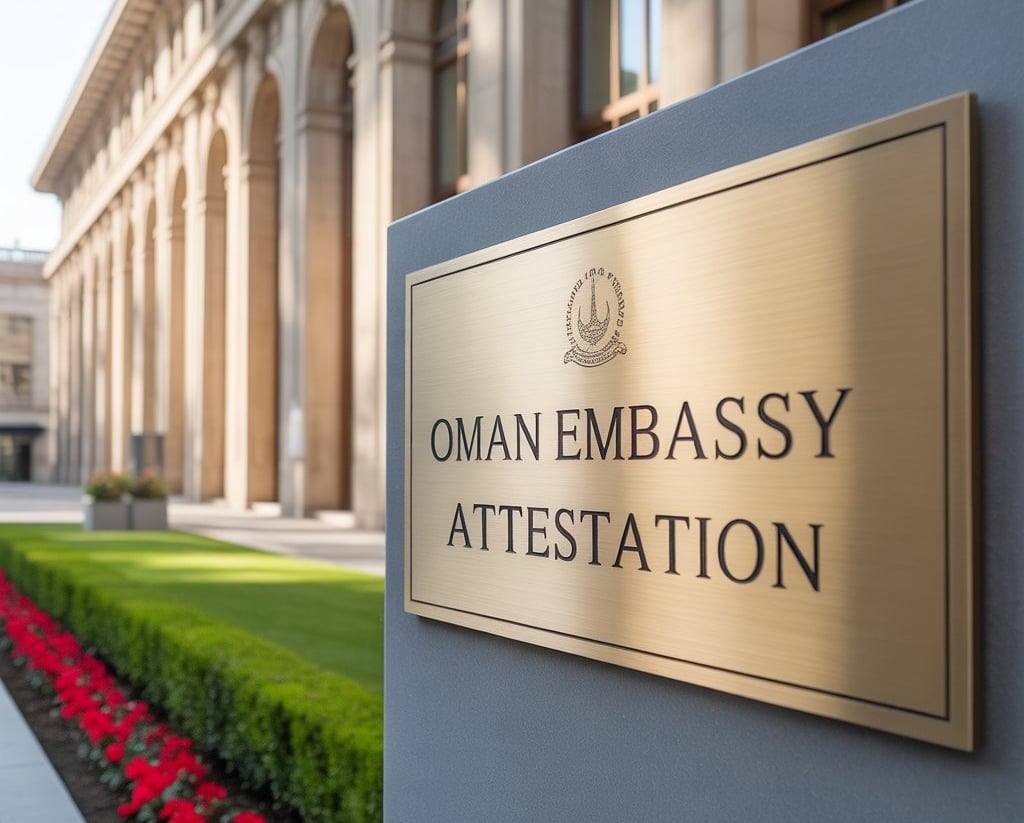Oman Embassy Attestation Process Explained
Learn about the Oman embassy attestation process, including detailed timelines, fees, and requirements. Ensure your documents are properly attested for a smooth experience.
10/31/20257 min read


Introduction to Embassy Attestation
Embassy attestation serves as a critical process for the validation and legalization of documents intended for use in foreign countries. Specifically, when dealing with the Oman embassy, this process becomes particularly significant for those seeking employment, pursuing educational opportunities, or applying for residency in Oman. The attestation procedure ensures that documents such as degrees, marriage certificates, and birth certificates are recognized as authentic and valid by the Omani authorities. This validation plays a crucial role in enabling individuals to navigate legal requirements effectively and without unnecessary complications.
The involvement of the embassy is pivotal in confirming the legitimacy of various documents. The Oman embassy acts as the competent authority that verifies the signatures and seals of the originators of these documents, ensuring they meet Oman’s legal standards. Without proper attestation, documents may be considered invalid, leading to potential delays or obstacles in administrative processes related to visas, employment contracts, and educational enrollments. The integrity of the attestation process not only protects individuals but also establishes a legal framework that facilitates international mobility and cooperation.
Given the increasing number of expatriates looking to settle or work in Oman, understanding the intricacies of the embassy attestation process is essential. It is important to be aware of the specific requirements, timelines, and fees involved to avoid any disruptions during the application process. Each document type may have different legal prerequisites that must be satisfied before submission to the Oman embassy. Hence, a well-informed approach to the embassy attestation process contributes to a smoother experience for individuals aiming to secure their future in Oman.
Key Documents Required for Attestation
The attestation process is a critical step for individuals seeking to validate their documents for use in Oman. A comprehensive understanding of the key documents required for attestation is essential for ensuring a smooth procedure. The primary documents typically needed include educational certificates, marriage certificates, and various legal documents, each with its unique significance and requirements.
Firstly, educational certificates—such as degrees, diplomas, and transcripts—are crucial for individuals pursuing employment or further education in Oman. These documents must be issued by recognized educational institutions and often require verification from respective government bodies in the country of origin. Additionally, graduates may need to obtain an equivalence certificate from the relevant Oman authority to confirm the validity and level of their qualifications.
Marriage certificates are another vital document, particularly for expatriates wishing to sponsor their spouses. This certificate ensures that the marriage is legally recognized and requires attestation from the issuing authority, along with possible translations into Arabic if originally in another language. Depending on the country of origin, additional documentation such as divorce decrees or death certificates of previous spouses may also be necessary.
Moreover, other relevant legal documents, including birth certificates and commercial documents, may be required depending on specific circumstances. Birth certificates often need to be attested to facilitate residency visas for children. Similarly, commercial documents, including business registration certificates, may necessitate attestation for individuals seeking to establish a business presence in Oman.
In conclusion, understanding the scope and requirements of documents essential for the attestation process in Oman will greatly aid individuals in navigating the complexities of legal validation. Ensuring that all documents are properly prepared and meet the necessary criteria is imperative for a successful attestation process.
Step-by-Step Attestation Process
The attestation process for documents intended for use in Oman involves several critical steps to ensure compliance with the local laws. Preparing adequately and understanding each step can facilitate a smoother experience. The first step begins with gathering essential documents that need to be attested. These typically include original documents which may be educational certificates, marriage certificates, or business documents, depending on the purpose of your attestation.
Once you have assembled the necessary documents, the next crucial step is to verify them with the relevant authorities in your home country. This may involve obtaining a notarization or an apostille from a recognized authority. Ensure that all documents are free from errors, as inaccuracies can lead to delays or potential rejections during the attestation process.
After securing the initial verification, the documents should then be submitted to the appropriate ministry or department in your home country. This usually involves submitting to the Ministry of Foreign Affairs or a similar authority that handles international documentation. Following this, you must prepare for the final submission at the Oman embassy or consulate. Be aware of their specific requirements, such as application forms, processing fees, and additional identification documents.
Timing is crucial; ensure to check the embassy's operational hours and any public holidays that may affect processing time. Once inside the embassy, present your documents clearly and respectfully, and keep copies of everything submitted. It’s advisable to follow up on your application status to avoid unnecessary delays. Throughout the entire process, remain organized, keep records, and stay informed about the latest requirements on the Oman government’s official channels to smooth out potential pitfalls. This thorough approach can significantly enhance the efficiency of the attestation process.
Timelines for the Attestation Process
The attestation process for documents intended for use in Oman can vary significantly in terms of timelines, influenced by several factors. On average, the process can take anywhere from a few days to several weeks, depending on the specific type of document being attested. Common documents include educational certificates, commercial documents, and personal documents, each of which may have different processing times based on their nature and the attestation authority involved.
Firstly, the type of document plays a critical role in determining the timeline. For instance, educational certificates and degrees typically require a more extensive verification process, leading to longer processing times. In contrast, personal documents such as marriage or birth certificates may be processed more quickly, as their verification can be less complex. It is important to ascertain the specific requirements and processing details for your document type beforehand, as this can aid in setting realistic timelines.
Additionally, the volume of applications being processed by the attestation authority can affect the speed of service. During peak seasons, such as the start of academic sessions or holiday periods when many expatriates seek attestation, processing times can increase significantly due to higher demand. Furthermore, unexpected circumstances, including administrative delays or public holidays, can also contribute to longer processing times, so it is advisable to account for any potential delays when planning your application.
In general, applicants should anticipate a processing time of around 7 to 15 business days for most documents, although some cases may extend beyond this range. Therefore, it is highly recommended to initiate the attestation process as early as possible to avoid last-minute inconveniences.
Fees Associated with Attestation
The attestation process is an essential step for individuals seeking validation of their documents in Oman, and understanding the associated fees is crucial for effective planning. The costs involved can vary based on several factors, including the type of document being attested and the services utilized. Typically, the primary fees will be charged directly by the Oman embassy. These fees generally cover the basic attestation service for standard documents, which may include educational certificates, marriage certificates, and legal documents.
In addition to the embassy fees, applicants may encounter additional service charges from third-party agencies that facilitate the attestation process. These agencies can provide valuable assistance in terms of document preparation and submission, often expediting the entire process. It is important for applicants to inquire about these service charges and consider them as part of their overall attestation expenses. Depending on the agency, fees can vary significantly, so engaging in thorough research is advised to ensure competitiveness and transparency.
Applicants should also be mindful of potential hidden costs that may arise during the attestation journey. Costs such as courier fees for document delivery to and from the embassy, notary fees for document verification, or translation fees for non-English documents can quickly add to the overall expense. Therefore, a detailed budget should be created in advance, taking all these factors into consideration.
Regarding payment methods, the Oman embassy typically accepts various forms of payment, including cash and credit card transactions. It is advisable to check the specific payment policies directly with the embassy beforehand to ensure compliance and avoid any inconveniences during the submission process.
Common Challenges and Solutions
Applicants often encounter various challenges during the Oman Embassy attestation process, which can lead to unnecessary delays and confusion. One of the most prevalent issues is document discrepancies. This can occur due to clerical errors, miscommunication, or a lack of coordination between various entities involved in the attestation process. To mitigate this risk, it is advisable to meticulously review all documents before submission. Ensuring that names, dates, and other critical information are accurate and consistent across all documents will help prevent complications. Additionally, maintaining an open line of communication with both the issuing authority and the embassy can provide clarity on specific requirements.
Delays are another common hurdle that applicants face. These may arise from a high volume of applications at the embassy or unforeseen interruptions in their processing routines. To combat delays, applicants should allow for ample processing time when planning their submissions. It is often prudent to initiate the attestation process well in advance of any deadlines. Furthermore, tracking the application status through provided channels can help applicants stay informed about its progress, leading to timely intervention if issues arise.
Misunderstandings regarding the requirements for specific documents can also impede the attestation process. Applicants might not have a clear understanding of the necessity for certain verifications or the correct format for submission. To alleviate this confusion, it is beneficial for applicants to visit the official embassy website or consult reputable immigration lawyers specializing in Oman’s processes. These resources typically outline the necessary documentation in detail and can offer insight into various situational specifics.
By proactively addressing these common challenges, applicants can enhance their experience during the Oman Embassy attestation process, ensuring a smoother pathway toward meeting their goals.
Conclusion and Final Tips
In summation, the Oman embassy attestation process plays a crucial role in ensuring that documents are valid and recognized in Oman. Throughout this blog post, we explored the key steps involved in the attestation process, including the necessary documentation, the applicable timelines, and the fees associated with it. Understanding these elements is essential for individuals seeking to engage in legal, educational, or business-related activities in Oman.
As you prepare for your attestation journey, it is vital to maintain clear and open communication with the embassy. This transparency will help you to navigate any inquiries or requests for additional information more smoothly. Keeping contact information handy, along with the details of your application, can facilitate quicker responses from embassy officials. Establishing a professional relationship with the embassy staff can significantly ease the process, helping to clarify any doubts regarding document submission or other requirements.
Furthermore, double-checking the specific document requirements before submission is a step that should not be overlooked. Each document may have unique specifications based on its purpose and nature. Ensuring that all paperwork is correctly formatted and completed will help to prevent delays that may arise from insufficient or incorrect information.
Lastly, keeping track of your application status is key to a successful attestation process. Staying informed will enable you to act promptly if issues arise, thereby ensuring that your application is processed in a timely manner. Proper attestation is not merely a bureaucratic hurdle; it is integral to achieving your goals related to Oman, whether they pertain to employment, education, or personal matters. By adhering to these final tips, you can pave the way for a seamless attestation experience.
